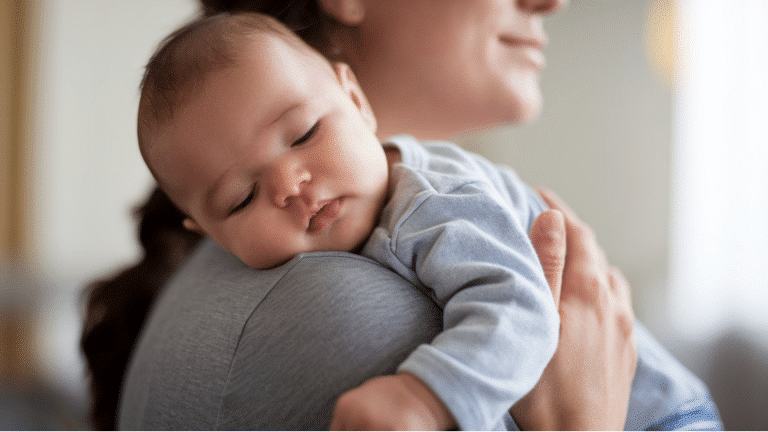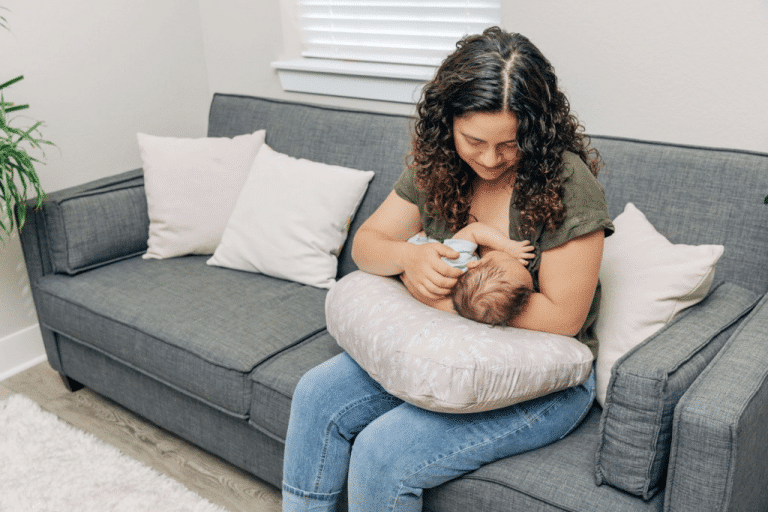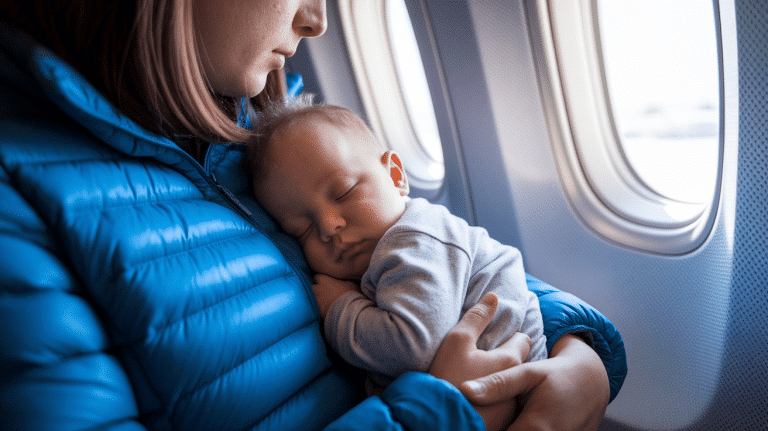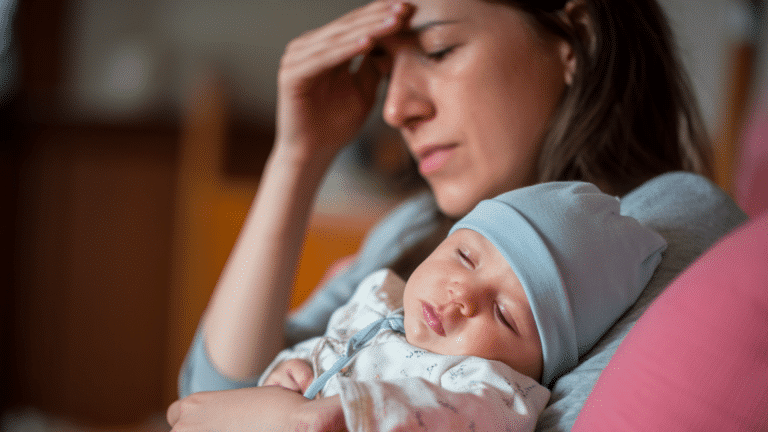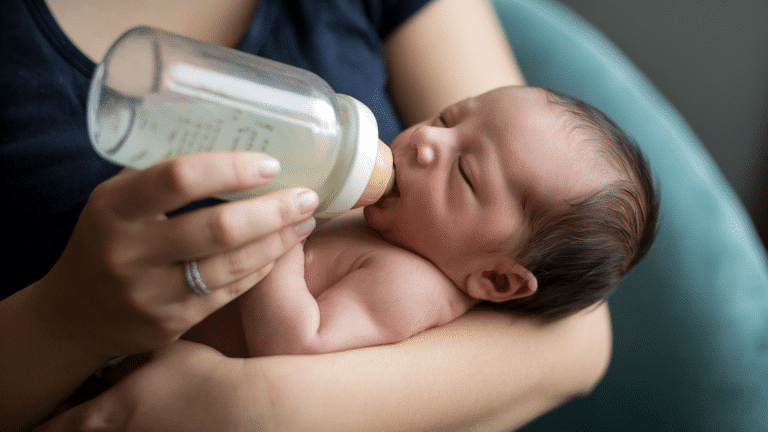“Should I wake my sleeping baby?” Every parent has whispered this question while watching their little one sleep peacefully.
It’s a tough spot. You know sleep is precious for babies, but sometimes you wonder if you should interrupt that peaceful moment. I know it feels wrong to wake a sleeping baby.
But there are times when a gentle wake-up helps keep your baby’s daily routine on track.
In this guide, you’ll learn:
- When it’s okay (and needed) to wake your baby
- How to do it softly and calmly
- Simple tips to keep nap times working well
Let’s get started!
When and Why It’s Necessary to Wake Your Sleeping Baby?
Sometimes, waking your sleeping baby helps them stay healthy and grow well. Let me share the most important times when and why you should wake your little one.
1. Newborns Need Regular Feeding
If your baby is under 4 weeks old or hasn’t regained their birth weight, it’s important to wake them every 2–3 hours for feeding. Their tiny stomachs can’t hold much, so regular feeding supports healthy growth.
I had to do this often, and it really helped my baby stay on track early on.
2. Jaundice Or Other Health Issues
When my baby had mild jaundice, I had to wake her more often. Your doctor might ask you to do the same. Feeding helps flush out extra bilirubin.
If your baby has a medical reason, sticking to a set feeding schedule, even during naps, can make a big difference in recovery and energy levels.
3. Nap Is Too Long
Sometimes, long naps can affect bedtime. If your baby naps for over 2 hours during the day, they may not be tired at night. I learned to gently wake my baby so we could stay on schedule.
It helped keep bedtime easier and prevented late-night wakeups that threw off the rest of our day.
4. Nap Is Too Close To Bedtime
A late nap can make it harder for your baby to fall asleep at night. I’ve found that if my baby sleeps too close to bedtime, waking them early helps.
Keeping a little space between naps and bedtime made our evenings smoother and helped everyone in the house get better rest.
5. Long Gaps Between Feedings
Even after my baby started sleeping longer, I watched for long gaps. If it had been more than 4 hours since their last feed during the day, I’d wake them. This helped them get enough milk during the day and sleep better at night.
How Long Will Your Newborn Sleep?
Newborn sleep is very different from adult sleep. I didn’t know what to expect at first, and you might feel the same. Your baby will sleep a lot, but in short stretches.
1. Total Daily Sleep: Newborns usually sleep around 14 to 17 hours a day, but not all at once. I was surprised by how much my baby slept in short bursts. Your baby may nap throughout the day and night, waking for feedings every few hours.
2. Short Sleep Stretches: At first, your newborn may only sleep 1 to 3 hours at a time. I remember those quick naps well. Since their tummies are small, they wake often to eat. These short sleep cycles help them stay full and grow.
3. No Real Day or Night: In the early days, babies didn’t know the difference between night and day. Expect sleep to be spread out around the clock. Their internal clock is still developing, so nighttime sleep may take some time.
4. Changes After a Few Weeks: After 6 to 8 weeks, many babies start sleeping a little longer at night. I noticed longer stretches of sleep, which gave me some relief. Your baby may sleep 4 to 5 hours in a row at night as they grow and eat more at each feeding.
5. Every Baby Is Different: Some babies sleep more, and some sleep less. As long as your baby is eating, growing, and seems content, their sleep pattern is likely just fine. If you’re unsure, your doctor can help you understand what’s normal for your baby’s age and health.
Signs of Healthy Sleep
- Wakes for feeds
- Makes small movements while sleeping
- Has alert periods during the day
- Shows tired signs before sleep
Some babies sleep more, others less. Your baby might not match these numbers exactly – that’s okay. What matters is that they’re growing well and seem happy when awake.
What Are the Risks of Not Waking Your Sleeping Baby?
Letting your baby sleep sounds harmless, but sometimes it can cause problems. I’ve had moments when I wasn’t sure if I should wake my baby or let them rest.
If you’re wondering about the risks, this is what I learned and what you might want to keep in mind.
1. Missed Feedings
In the early weeks, babies need to eat often. If your baby skips feedings, they might not get enough calories to grow well. I had to wake mine to keep up with feeding goals.
You may feel unsure at first, but staying on track with feeding helps your baby stay healthy and gain weight steadily.
2. Slower Weight Gain
I once noticed my baby wasn’t gaining as quickly as expected. Long sleep stretches can lead to fewer feedings, which may slow weight gain.
If your baby hasn’t regained their birth weight or is struggling to grow, waking them for regular feeds makes a big difference. It’s something your doctor will likely recommend, too.
3. Worsening Jaundice
My baby had mild jaundice, and sleep made it harder to treat. Jaundice can get worse if your baby isn’t feeding enough, since feeding helps flush out bilirubin.
Waking them to eat keeps things moving. You might feel bad disturbing their sleep, but it supports recovery and keeps them hydrated.
4. Disrupted Sleep Patterns Later
Letting your baby nap too long during the day affected our nights. Over-sleeping during the day can shift your baby’s body clock, leading to less nighttime sleep.
I learned to keep naps balanced, even if it meant gently waking my baby. It helped build a better routine over time.
5. Missed Signs Of Illness
There were days my baby slept more than usual, and I almost missed the early signs of sickness. If a baby sleeps too long or too deeply, it could be a clue that they’re not feeling well.
Waking them to feed or check in can help you spot changes early and get help if needed.
Signs Your Baby Needs to Be Woken Up
Sometimes it’s hard to know when it’s okay to let your baby sleep and when it’s better to wake them.
I’ve faced this question many times. If you’re unsure too, here are some signs that told me it was time to gently wake my baby.
Feeding Warning Signs
If your newborn goes more than 3 hours without eating, it’s usually time to wake them. I also noticed fewer wet diapers when my baby missed feedings, which told me something was off.
If they sleep through their regular feeding times or don’t finish a full feed when awake, it’s a sign they may need some help staying on schedule.
Sleep Pattern Changes
Sometimes naps get too long. If your baby sleeps for more than 2.5 hours during the day or sleeps past their normal morning wake-up time, it may throw off the rest of the day.
I’ve also seen issues when my baby took late evening naps or missed regular social and play times. These changes can make nighttime sleep harder.
Physical Signs to Watch
I always keep an eye on my baby’s color and comfort. If their skin looks extra pale or yellow, or they’re too warm or sweaty, I check in.
Deep sleep is fine, but if your baby is hard to wake or seems too still, that’s something to act on. Breathing that sounds different from usual is also a sign to wake them and check.
Daily Schedule Signs
When I noticed my baby’s morning wake time getting later every day, it started to affect everything else.
If feedings keep getting delayed or your baby mixes up day and night sleep, that’s a sign they may be getting too much sleep at the wrong times. I also try not to let them miss active or playtime during the day.
How to Wake Your Sleeping Baby?
Sometimes you’ll need to wake your baby, and doing it gently makes a big difference. I’ve tried different methods to make wake-ups easier for both of us. These are some simple ways you can try:
- Gently rub their back, arms, or legs
- Undress them down to their diaper
- Use a soft voice
- Open the curtains or turn on a soft light
- Change their diaper
- Tickle the soles of their feet
- Hold them upright against your chest
- Offer the breast or bottle
When Should You Avoid Waking Your Baby?
I’ve learned that not all sleep needs to be interrupted. In many cases, it’s better to let your baby rest. Here are times when waking up your little one isn’t necessary:
- Birth weight has been regained
- Resting calmly during nighttime sleep
- Moved beyond the newborn phase
- Getting enough food throughout the day
- Fell asleep a short time ago
Conclusion
I know how hard it can be to decide if you should wake your sleeping baby. I’ve faced those same questions and worries. The truth is, sometimes it’s necessary, especially for feedings, health reasons, or routine.
But other times, it’s okay to let your baby sleep, as long as they’re growing and doing well.
You don’t have to get it perfect every time. Watching your baby’s cues and following your doctor’s advice will help you make the best choice.
I found that using gentle wake-up methods and keeping things calm made a big difference. And when it wasn’t needed, I let my baby rest without guilt.
Every baby is different, and you’ll learn what works best over time. Trust yourself, you’re doing a great job. If you’re ever unsure, just ask your pediatrician.
That gave me peace of mind, too.

